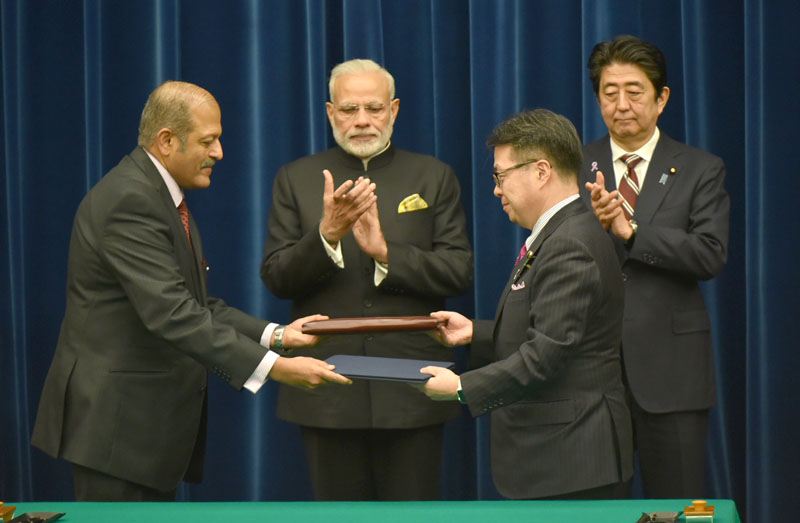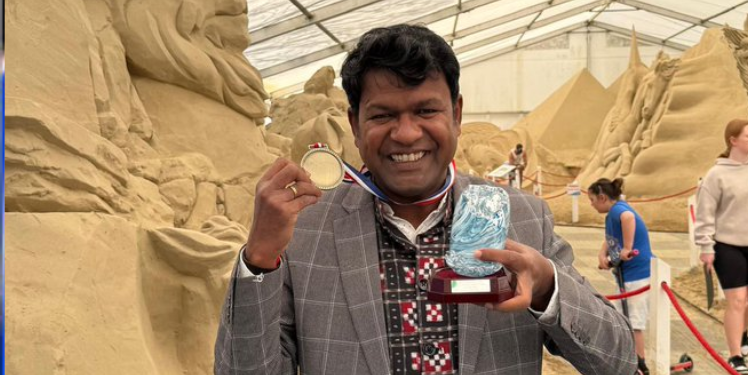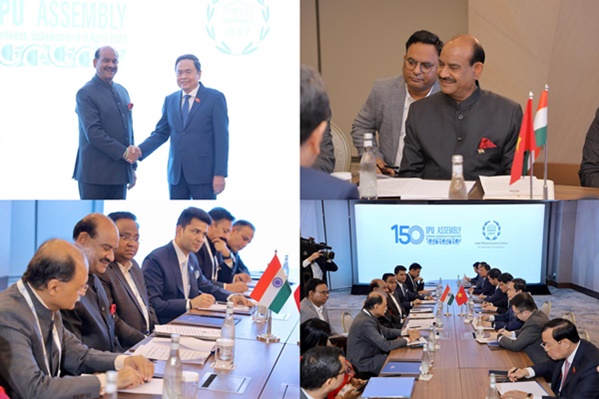India signs civil N-deal with Japan

Shedding its
reservations, Japan on Friday made an exception to sign a landmark civil
nuclear deal with India.This will open the door for export of its atomic
technology and reactors after adding features like safety and security keeping
in mind its sensitivities on the issue.
The nuclear deal, described historic by Prime Minister Narendra Modi, was part of the 10 agreements signed between the two countries in various areas after he held talks with his Japanese counterpart Shinzo Abe on the second day of his three-day visit.
They held wide-ranging talks that covered aspects like trade and investment, security, terrorism, cooperation in skill development, aerospace and people-to-people contacts.The nuclear agreement comes after tough negotiations for over six years between the two countries.
Foreign Secretary S Jaishankar said the nuclear deal was similar to the ones signed with the US and other countries with added features on safety and security in keeping with Japan’s sensitivities.
The two leaders, despite objections from China, also discussed the South China Sea issue and agreed on the need for respecting freedom of navigation and overflight in tune with the principles of the United Nations Convention on the Law of the Sea.
The nuclear agreement will also push implementation of the Indo-US atomic cooperation agreement since the major American companies in this sector have alliances with Japanese companies like GE-Hitachi and Toshiba-Westinghouse Electric Company.
The deal will come into effect as soon as the Japanese Parliament approves it.Abe, while noting that his country was the only one to have suffered atom bomb attacks, said he was “delighted” over the signing of the agreement with India, despite it not being a signatory to the nuclear Non-Proliferation Treaty (NPT).
At the same time, Abe, with Modi standing next to him, appeared to remind India about NPT, saying his country wishes to see universalisation of the treaty, which New Delhi terms “flawed”.
“This agreement is a
legal
framework that India will act responsibly in peaceful uses of nuclear
energy and also in the non-proliferation regime, even though India is not a
participant or signatory of NPT,” he said at a joint press interaction with
Modi.
“It (the agreement) is in line with Japan’s ambition to create a world without nuclear weapons,” said Abe, whose country has traditionally adopted a tough stand on proliferation issues having been the only victim of atomic bombings during World War II.
He noted that India
in September 2008 had made its intention of peaceful uses of nuclear energy and
also announced moratorium on nuclear tests.
“Today’s (Friday) signing of the Agreement for Cooperation in Peaceful Uses of Nuclear Energy marks a historic step in our engagement to build a clean energy partnership...Our cooperation in this field will help us combat the challenge of climate change,” Modi said.
Apparently with
Japan’s sensitivity in mind, he added, “I also acknowledge the special
significance that such an agreement has for Japan”.He thanked Abe, the Japanese
government and Parliament for their support to the agreement.
Other nations who have signed civil nuclear deal with India include the US, Russia, South Korea, Mongolia, France, Namibia, Argentina, Canada, Kazakhstan and Australia. In his remarks, Modi said as democracies, the two countries “support openness, transparency and the rule of law”.
“We are also united in our resolve to combat the menace of terrorism, especially cross-border terrorism,” he said.
The landmark Indo-Japan nuclear agreement is strikingly similar to atomic agreements India inked with the US and most of the other countries, having provisions like ‘termination’ clause, Jaishankar said. However, he added that this pact has some added features like on safety and security reflecting Japan’s concerns.
Also, the four steps – 123 agreement (2007), NSG waiver (2008), Reprocessing pact (2010) and Administrative mechanisms (2013) – that were part of the Indo-US deal have been “compressed” and “captured” in the deal with Japan, he added.
AIMIM News
Latest Urdu News
Most Viewed
Do you think Canada-India relations will improve under New PM Mark Carney?






















.jpg)
.jpg)
.jpg)

















